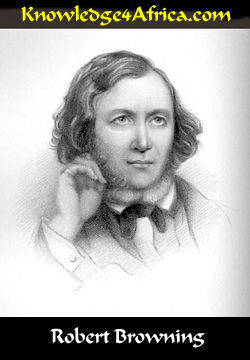|
READ THIS
Robert Browning's "My Last Duchess" is a dramatic monologue, spoken by the Duke of Ferrara
who explains to a suitor's ambassador why he had ordered his previous wife to be executed.
The Duke reveals himself to be an irrationally jealous man who could not bear to have his wife even
smiling at any other man. Eventually his jealousies got the better of him and he gave orders, and his wife
was executed. But, with her death, came the death of happiness all about him.
 READ THE FOLLOWING PASSAGE
READ THE FOLLOWING PASSAGE
Robert Browning was born in 1812 in Camberwell near London. His family had made a fortune
in plantations in the West Indies, which meant that the young Robert grew up surrounded by
books and had already written his own poetry anthology by the age of 12, although it went
unpublished.
He was home-tutored and was fluent in several European languages. As a teenager, he was
surrounded by the work of the Romantic poets but would not be able to go to university because
his parents objected to the Church of England which held sway at both Oxford and Cambridge.
He despised the idea of a "formal career". Indeed, he was probably wealthy enough to survive
without one and, in any case, he stayed at home till his early 30s. Instead he dedicated his life
to the reading and writing of poetry, relying on his father to sponsor him, at least till he married
and left home.
Only at the age of 33 did he meet someone with whom to spend the rest of his life. This was
Elizabeth Barrett, a poet although a semi-invalid who was six years older than he. When they
eventually married, her father disinherited her because he objected to any of his daughters
marrying. Nevertheless, the union of the two was good for both their literary careers.
The couple chose to leave England and settled in Italy, at first at Pisa and then Florence. It was
there that Browning became a student of Italian art and literature, something which would reflect
in his poem "My last duchess". They had a son whom they nicknamed "Penini".
Browning was a prodigious writer of poetry but would come under severe criticism for
apparently abandoning England in favour of Italy. He would die in Venice in December 1889.
He was then 77 years of age.
Have you looked at the questions
in the right column?
|
TEST YOURSELF!
Read the left column and then answer
the following questions:
She liked whate'er
She looked on, and her looks went everywhere.
Sir, 'twas all one! My favour at her breast,
The dropping of the daylight in the West,
The bough of cherries some officious fool
Broke in the orchard for her, the white mule
She rode with round the terrace -- all and each
Would draw from her alike the approving speech,
Or blush, at least.
- Comment on the TONE of the Duke's words when he says,"She liked whate'er she looked on and
her looks went everywhere". (2)

[Need help?]
Doesn't the Duke reveal "jealousy", perhaps "anger" and a little "frustration" that his
wife, the Duchess, doesn't hold him as the centre of her life?
|
- Explain "my favour at her breast". (2)

[Need help?]
When the Duke did something to flatter the Duchess or did something nice for her.
|
- What was the problem with the "officious fool". How did the nobleman feel towards
him? (2)

[Need help?]
By "officious fool", the Duke means someone who is "too eager to help".
The Duke was intensely jealous at what he regarded as interference by the "officious fool".
|
- Explain what the Duke means by "approving speech". (2)

[Need help?]
The Duchess "expressed gratitude" whenever anyone did something for her.
|
She thanked men, -- good! but thanked
Somehow -- I know not how -- as if she ranked
My gift of a nine-hundred-years-old name
With anybody's gift.
- What is the purpose of the word "good'? (2)

[Need help?]
The Duke means that it is right, it is good manners to thank people.
|
- Why was the Duke angry with her manner of thanking people? (3)

[Need help?]
The Duchess thanked everyone for anything in the same fashion. She did not distinguish between his
gifts and those from others when saying thank you. The Duke felt that she should have expressed her
gratitude to him personally in a better manner.
|
Even had you skill
In speech -- (which I have not) -- to make your will
Quite clear to such an one, and say, "Just this
Or that in you disgusts me; here you miss,
Or there exceed the mark" -- and if she let
Herself be lessoned so, nor plainly set
Her wits to yours, forsooth, and made excuse,
--E'en then would be some stooping, and I choose
Never to stoop.
- Why did he never tell her how he felt about her manner of expressing her gratitude? (2)

[Need help?]
It would be below the Duke's dignity to reprimand his wife. He felt that she should know better. He seems
also unable to express his feelings clearly.
|
- Explain: "here you miss, or there exceed the mark". (2)

[Need help?]
The Duke believes that his wife does or says too little. In other ways he believes that she goes too far.
|
- What does the Duke mean when he says, "If she let herself be lessoned so, nor plainly set her wits
to yours"? (2)

[Need help?]
The Duke means, "If she would listen to what I said or fell in with my wishes".
|
|



